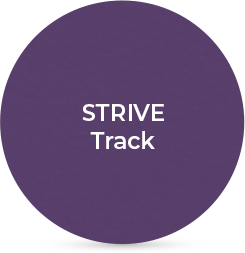
STRIVE TRACK
Safety, Transition, Responsibility, Independence, Values, Empowerment
The STRIVE Track creates a unique treatment experience for students who may not need the typical Residential Treatment Center (RTC) level of care. Upon admission, all students will be eligible for the STRIVE Track, with guidelines for those who will qualify. If a student is approved for the STRIVE Track, they will move to Mosaic House, the transition home around their three-month mark. STRIVE students may stay in the program for the typical length of stay but will spend the majority of their time with us focusing on transitional living skills. They will continue to receive all educational and clinical services but residentially, they will have more opportunities to live autonomously. Students who do not meet the STRIVE Track requirements may still move to Mosaic House on a traditional track when approved by the treatment team.
Mosaic House-Our Transitional Home
At Mosaic House, our transitional home, we understand the importance of a gradual transition for students from a highly structured environment to one with more freedom. We recognize that abruptly exposing students to an environment with minimal structure and high freedom can overwhelm their coping skills. Therefore, we place great emphasis on the transition period in our program before students move on to the next part of their journey.
During the transition phase, we purposefully introduce challenges that allow them to gain experience in dealing with the typical day-to-day obstacles, both within and outside of our program. The transition period serves as an important bridge between the highly structured environment of La Europa and the more independent settings they will encounter in their future endeavors.
Our primary goal, before graduation, is to ensure that each student can implement, practice, and demonstrate mastery of DBT and other life skills they have learned while at Mosaic House. We recognize that they have learned and practiced these skills in a structured and supportive setting, nevertheless, we believe students must be challenged to apply these skills in new settings as well.
By gradually introducing more freedom and responsibility, we aim to prepare our students for the realities of life outside our program. We want to ensure they are equipped with the necessary skills to adapt and navigate various environments to successfully manage the challenges they may encounter.
While in the transitional phase, students will have the opportunity to
- Practice newly learned skills in 'real-life' situations
- Solidify their identity and understanding of who they are before returning home to friends and family where pressure to revert to old behaviors or patterns is strongest.
- Experience age-appropriate challenges as they are gradually given more freedoms and privileges.
- Accept daily coaching from staff and peer mentors.
- Strengthen their tolerance and ability to accept when their parents hold boundaries with them. We understand it is difficult for parents at home to maintain the level of containment many students need to gradually shift from the restrictive treatment experience to being a typical teenager at home.
- Increase internal motivation and commitment to healthy behaviors.
- Use effective coping skills.
- Learn to handle a setback when they accidentally lapse into old pattern behavior.
- Appropriately handle the use of technology once introduced.
Life at Mosaic House
Mosaic House provides a supportive, home-like environment just a half-mile from La Europa Academy, offering a safe space for students to focus on individualized transition goals. While residing at Mosaic House, students continue their schoolwork and therapy sessions at La Europa, maintaining therapeutic support while learning to navigate the challenges of independent living.
-
Meal planning and food preparation
-
Time management and scheduling
-
Navigating internet safety and understanding online risks
-
Setting boundaries with technology use
-
Accessing and utilizing community resources
-
Volunteering in the local community
-
Job readiness, including resume building and interview skills
-
Managing job responsibilities
-
Money management and budgeting
-
Experiencing independence off campus without staff supervision
-
Participating in Drivers Education courses to support safe and responsible driving
Home visits:
Home Visits Are Important to Transition
At La Europa, we understand the importance of preparing both students and their families for a successful transition back home. The home visit process is an essential part of this preparation, offering an opportunity for families to practice and reinforce the new skills that students have learned during their time in our program.
During these visits, families have the chance to work together to integrate new coping strategies, communication tools, and emotional regulation techniques into their home environment. The goal is for students and their families to experience the dynamics of these changes in a real-life setting, providing a supportive foundation for the transition ahead.
Home visits also serve as a time to focus on practical elements of the transition. Families collaborate with their therapists to establish ongoing support, identify local community groups, and ensure that educational resources are in place, including coordinating with the student’s school to ensure a smooth academic transition.
We believe that these visits are crucial in ensuring that students not only succeed during their time with us but also feel supported and empowered as they return home, allowing the entire family to adapt to the new skills and progress made during treatment.



